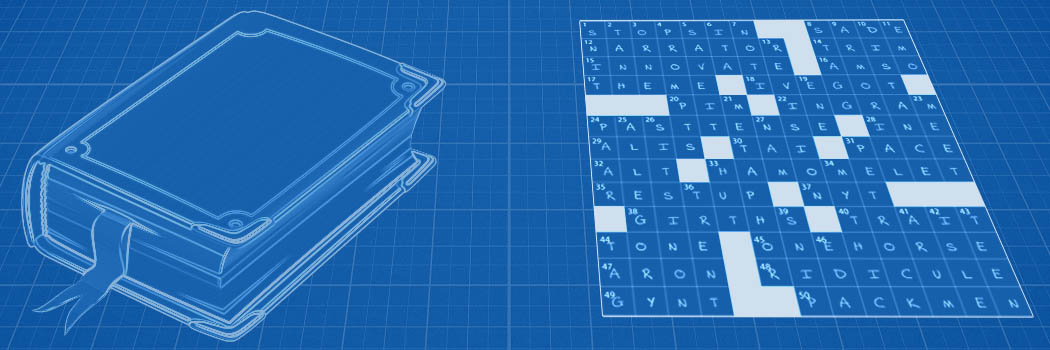 As a wordplay enthusiast and puzzle designer, I’m often struck by the similarities between puzzle design and writing fiction. Both are exercises in encoding information.
As a wordplay enthusiast and puzzle designer, I’m often struck by the similarities between puzzle design and writing fiction. Both are exercises in encoding information.
Puzzle constructors conceal their solution with misdirection and transformation, then reveal just enough information to explain the rules of the puzzle, and perhaps give the solver a subtle nudge here and there to guide them towards the answer.
Mysteries would seem to be the most obvious analogue to puzzles, but the parallels are not in the genre, they’re in the process of writing. Regardless of genre, fiction writers encrypt their message in theme and metaphor, hinting at the coming climax with clues and foreshadowing, throwing the reader off the trail with a clever bit of misdirection, until the final configuration is revealed and the reader is rewarded for committing to the journey.
The interplay between creator and consumer is simultaneously cooperative and competitive; we engage our audiences hoping to outsmart them, but knowing it is the audience that must win in the end. Mike Selinker and Thomas Snyder said it well in their invaluable guide, Puzzle Craft:
The puzzlemaker isn’t looking to beat the solver. That’s like taking candy from a baby. Instead, the puzzlemaker gives the solver all the tools to beat him. The puzzle’s clues and hints are designed to be fair and accessible at the solver’s level of difficulty. If the solver attacks the puzzle in the right way, she will defeat the challenge at a satisfying rate… If you are a puzzlemaker, you must be comfortable with losing every single time.
Constructors and authors may play to lose, but we’ll take our audiences on one hell of a ride first. The best puzzles leave the solver cursing the constructor’s cruelty, until that magical aha! moment when the solution becomes clear, the payoff is revealed, and their face lights up with that curious mixture of triumph, admiration, and bemusement that says, “You magnificent bastard… I don’t know why I didn’t see it sooner, all the clues were right under my nose! Will the next one be ready soon?”
That’s the same expression I get when I finish a good page-turner.
That’s the look I hope my readers will have on their faces when they close in on the final pages of my novels.
I like this analogy! Well done!
Absolutely! The resolution being unexpected, and yet could only have been inevitable. The final moment which leaves the reader to conclude, as you say, “I don’t know why I didn’t see it sooner, all the clues were right under my nose!”
I’ve only just recently discovered your blog and have so much enjoyed reading…and this piece in particular.
It is conveyed by, “I can’t wait to read the next one.”
The writer has most of the fun.